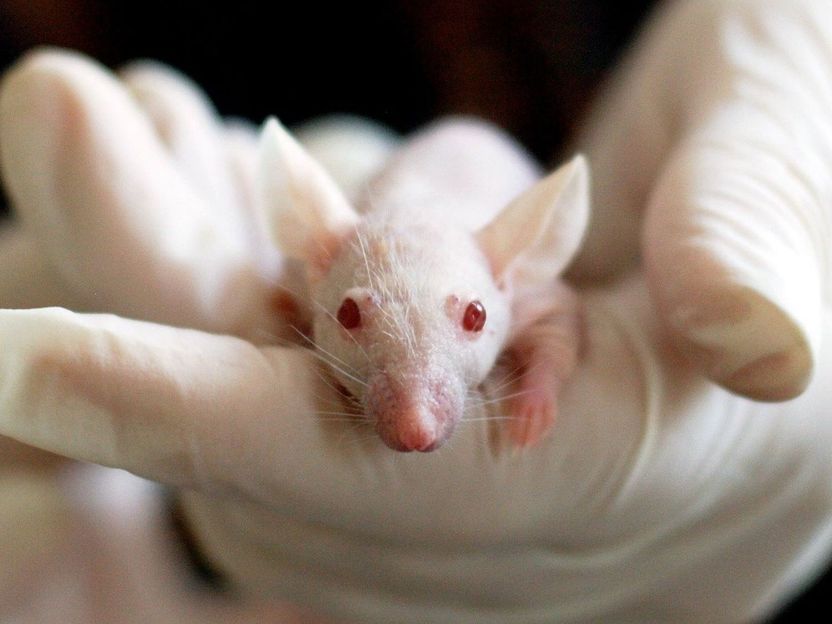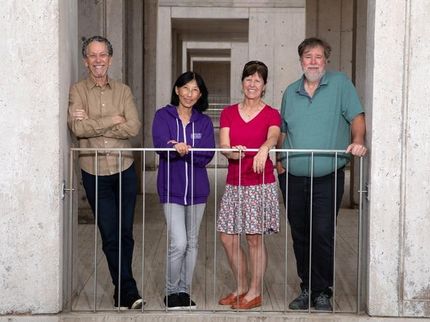Vaccination against hereditary colon cancer successful in mice
Delaying the development of hereditary colorectal cancer with a vaccination
Scientists from the German Cancer Research Center and Heidelberg University Hospital have for the first time been able to delay the development of hereditary colorectal cancer with a protective vaccination. Mice with a hereditary predisposition to colon cancer survived significantly longer after vaccination than unvaccinated conspecifics. A combination of the vaccination with an anti-inflammatory drug increased the protective effect.

Symbol image
Tibor Janosi Mozes auf Pixabay
In so-called microsatellite unstable cancers, an important cellular repair system that normally corrects small errors in the genetic material has failed. If such DNA defects remain uncorrected, the protein's entire blueprint can go out of sync. The cells then form new protein structures, so-called neoantigens, which are often recognised as foreign by the immune system.
Microsatellite unstable (MSI) tumors can develop spontaneously or as a result of a hereditary predisposition, Lynch syndrome. About a quarter of MSI colon tumors are caused by Lynch syndrome. About half of those affected develop cancer during their lifetime.
A team led by Magnus von Knebel Doeberitz, who heads a department based at both Heidelberg University Hospital and the German Cancer Research Center, was able to show in preliminary work carried out over many years that many patients with Lynch syndrome have identical mutations and thus identical neoantigens in their tumors.
"We therefore wanted to investigate whether such frequently occurring neoantigens are able to act as a protective vaccination to activate the immune system against the tumour cells and thus prevent cancer from developing," said Matthias Kloor, who leads the research on preventive vaccinations in Lynch syndrome.
A phase I/IIa clinical trial initiated by the Heidelberg researchers on the safety and immunological efficacy of such a vaccination has already been successfully completed at the Northwest Hospital in Frankfurt*. However, it will only be possible to assess whether this vaccination can actually prevent tumours and prolong the survival of patients in a few years' time.
However, the team led by von Knebel Doeberitz and Kloor has already achieved an important milestone on the road to cancer vaccination. With their current work, the researchers have shown for the first time in an animal model that a protective vaccination with MSI-typical neoantigens can actually protect against cancer. For this purpose, the team examined a mouse strain that develops colon cancer as a result of a defect in the DNA repair enzymes - comparable to humans suffering from Lynch syndrome. The "Lynch mice" develop tumours in the intestine from the age of six months and die a few weeks or months later.
In collaboration with Steven Lipkin from Weill Cornell Medical College in New York and colleagues from other US research institutions, the Heidelberg team identified different protein structures in the Lynch mice that occur as a result of the DNA defects. A special algorithm predicted which of these neoantigens could trigger a strong immune response in the mice. Four vaccine peptides were eventually selected for the experiments.
The vaccinated mice survived an average of 351 days, while unvaccinated animals survived only 263 days. The tumor mass was also significantly lower in the vaccinated animals. If the mice were given the drug naproxen in addition to the vaccination, this further increased the preventive effect of the vaccination. Naproxen is an anti-inflammatory and painkiller which, like aspirin, belongs to the group of non-steroidal anti-inflammatory drugs (NSAIDs). Agents from this group are already recommended in some countries for chemoprevention of colorectal cancer in patients with Lynch syndrome.
"Even in unvaccinated Lynch mice, we have seen that the immune system is active against the four neoantigens," explains Magnus von Knebel Doeberitz. "So our vaccination enhances an already existing natural immune response against the cancer cells."
"We were able to demonstrate for the first time in a living organism that vaccination with neoantigens protects against cancer," emphasizes Matthias Kloor, adding, "What is particularly promising is that immune protection and prevention with an anti-inflammatory apparently complement each other in their effect. The results show that vaccination against hereditary cancers is a promising concept that we now want to transfer further into clinical application."
The study was substantially funded by the National Cancer Institute (NCI) under the Cancer Moonshot program. Currently, the German-American team is working on the development of a clinical prevention program for hereditary tumor diseases.
Note: This article has been translated using a computer system without human intervention. LUMITOS offers these automatic translations to present a wider range of current news. Since this article has been translated with automatic translation, it is possible that it contains errors in vocabulary, syntax or grammar. The original article in German can be found here.
Original publication
Gebert J, Gelincik, Oezcan-Wahlbrink M , Marshall JD, Hernandez-Sanchez A, Urban K , Long M, Cortes E, Tosti E, Katzenmaier EM , Song Y, Elsaadi, Deng N, Vilar E, Fuchs V , Nelius N , Yuan YP, Ahadova A , et al. "Recurrent frameshift neoantigen vaccine elicits protective immunity with reduced tumor burden and improved overall survival in a Lynch syndrome mouse model"; Gastroenterology 2021.






















































